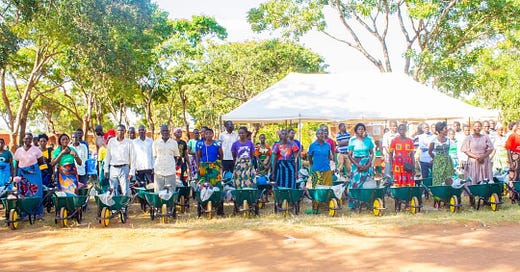
750 Mchinji farmers to benefit from food forest project
750 Mchinji farmers to benefit from food forest project, writes Bridget Mwanoka.
Mchinji District, Malawi - Around 750 new farmers in Traditional Authority Simphasi, Mchinji District, are set to benefit from the food forest project being implemented by the Permaculture Paradise Institute (PPI) and the Youth Alliance for Sustainable Development (YASD), writes Bridget Mwanoka.
On Sunday, May 21, 2023, PPI and YASD distributed essential tools and resources to support the farmers in their agricultural endeavours.
As part of the initiative, the partners handed out 100 wheelbarrows, 200 rabbits, 20,000 polythene tubes, tree seedlings, and 69 water canes to the 750 new farmers.
These resources will assist the farmers in working collectively in groups within the area.
Luwayo Biswick, the Founding Director of PPI, expressed his optimism about the project, stating, "These are new farmers who got trained in making home gardens and manure last month under the same project, and the startup tools will help them as they start implementing what they learned."
One of the beneficiaries, Tawina Wilson from Group Village Head Chikoloka, shared his gratitude, saying, "It was difficult for us to move manure from point A to point B, so this will surely ease the burden, and for those who didn't have money to buy seedlings, they can also breathe easy."
Raymond Nkhonya, the Director of Administration representing Mchinji District Commissioner, commended the initiative, highlighting its impact on food security and economic well-being.
Nkhonya said, "You can see that PPI and YASD have been offering onsite technical support for the implementation of permaculture and agroecology. This will not only make communities have food, but it will improve their families too, because, at the end of the day, they will have money after selling their yields."
The Food Forest Project, which aims to empower farmers with sustainable agricultural practises, has utilised approximately K15 million from the initial budget of 20 million kwacha to train farmers in Mchinji, Dowa, and Zomba districts.
The project seeks to promote food self-sufficiency and improve livelihoods in the region.









